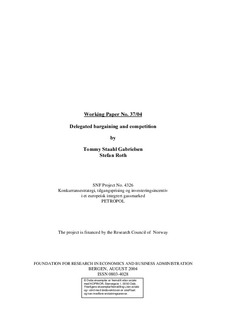| dc.description.abstract | In this paper, we analyze a two-producers two-agent model in which producers delegate sales and price negotiations to exclusive, separate, and independent agents. Producers first choose a pricing arrangement (two-part tariff versus linear tariff) and then set wholesale prices (and fixed fees)to their agents. Given this, agents announce prices to consumers as a basis for negotiations. Finally, consumers make their buying decision and bargain about the actually paid price once they arrive at an agent`s location. We show that both franchise pricing and linear pricing can be supported as equilibrium outcomes depending on the agents` fixed costs and consumers` bargaining power. With ex ante unobservable two-part tariffs consumers may be worse off from the ability to bargain and more so the higher their bargaining power. In the case of linear pricing, consumers gain from the ability to bargain and more so the higher bargaining power they have. On the balance, however, consumers are worse off from higher bargaining power due to the fact that increasing bargaining power affects the manufacturers` equilibrium actions regarding pricing schemes to the consumers` disadvantage. | en |
